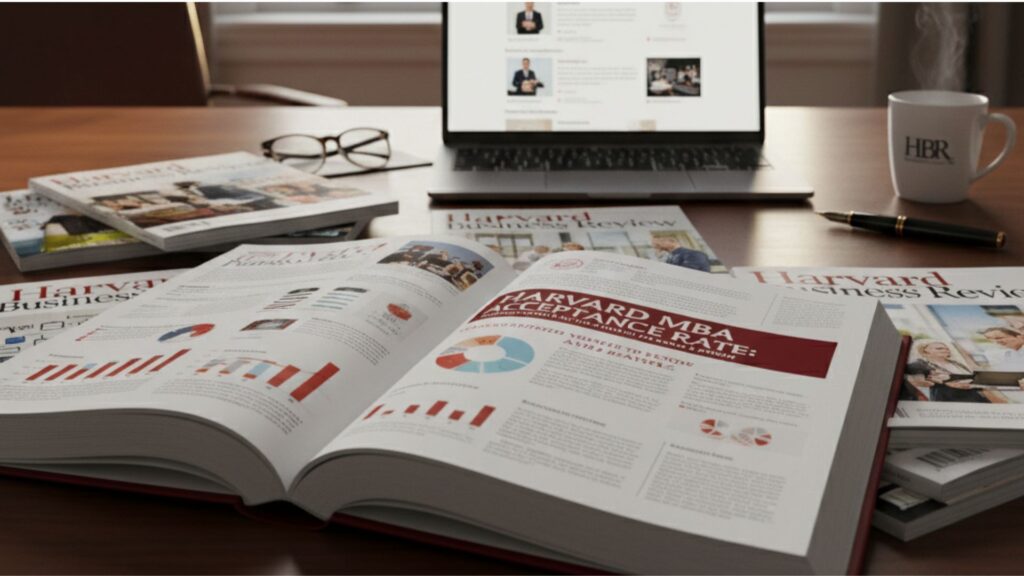Harvard MBA Acceptance Rate: Harvard Business School (HBS), part of Harvard University, is one of the most prestigious business schools in the world. Its Master of Business Administration (MBA) program is globally recognized for producing visionary leaders, entrepreneurs, and executives who drive innovation and excellence across industries. Because of its elite reputation and rigorous academic standards, the Harvard MBA acceptance rate is among the lowest in the world, making admission extremely competitive.

Understanding the Harvard MBA acceptance rate and the factors that influence admission can help aspiring candidates prepare more strategically for their application. This article provides a comprehensive overview of what the acceptance rate means, how it has changed over time, what Harvard looks for in an applicant, and how you can improve your chances of getting accepted.
Overview of Harvard MBA Program
The Harvard MBA program is a two-year, full-time, residential course designed to build leadership skills through a combination of case studies, team projects, and real-world business experiences. Each year, more than 9,000 applicants from across the world compete for around 900 seats, meaning only a small fraction gain admission.
The program’s emphasis on leadership, ethics, and innovation attracts individuals who are not only academically strong but also demonstrate exceptional personal and professional accomplishments. Harvard seeks candidates who will make a positive difference in the world through business leadership.
Harvard MBA Acceptance Rate Overview
The Harvard MBA acceptance rate typically ranges between 10% and 12%, depending on the application cycle. This means that out of every 100 applicants, only about 10–12 are admitted. In some competitive years, the rate can drop even lower.
While the acceptance rate is one indicator of selectivity, it doesn’t fully represent the complexity of the admissions process. Harvard evaluates each applicant holistically, considering not just academic credentials but also work experience, leadership potential, personal values, and overall contribution to the Harvard community.
Year-by-Year Trends in Harvard MBA Acceptance Rate
| Year | Number of Applicants | Number Admitted | Acceptance Rate |
|---|---|---|---|
| 2019 | 9,300 | 1,000 | 10.7% |
| 2020 | 8,900 | 930 | 10.4% |
| 2021 | 9,700 | 1,010 | 10.4% |
| 2022 | 8,600 | 970 | 11.2% |
| 2023 | 9,500 | 1,000 | 10.5% |
| 2024 | 8,800 | 980 | 11.1% |
These numbers show consistent competitiveness, with slight variations due to global economic trends, applicant pool strength, and program capacity.
Factors Influencing Harvard MBA Acceptance Rate
The acceptance rate at Harvard Business School is shaped by multiple factors, including the number of applicants, quality of applications, and overall program goals. Below are some key determinants:
1. Application Volume
Harvard receives thousands of applications each year from highly qualified candidates worldwide. A rise in applications typically leads to a lower acceptance rate due to limited seats.
2. Academic Excellence
Harvard expects strong academic performance. Most successful applicants have an undergraduate GPA above 3.6 (on a 4.0 scale). While there’s no official cutoff, academic rigor and consistency are crucial.
3. GMAT or GRE Scores
The average GMAT score for admitted students typically ranges from 720 to 750. High scores demonstrate analytical and quantitative strength, which is essential for MBA coursework.
4. Professional Experience
Successful applicants usually have 3 to 5 years of meaningful work experience. Harvard values impact, leadership, and progression over mere duration of employment.
5. Leadership and Extracurriculars
HBS seeks candidates who have led initiatives, influenced teams, or made measurable contributions in their organizations or communities.
6. Essays and Recommendations
Essays are critical for revealing an applicant’s personal motivations, ethics, and leadership mindset. Recommendations help validate professional achievements and character.
7. Interview Performance
Only shortlisted candidates receive interview invitations. These interviews are in-depth and focus on personal achievements, leadership style, and self-awareness.
8. Diversity and Global Representation
Harvard values diversity of thought, background, nationality, and industry experience. It admits students from over 70 countries annually.
What Harvard Looks For in MBA Applicants?
Harvard Business School’s admissions committee focuses on three core attributes:
- Habit of Leadership:
Harvard seeks candidates who have demonstrated leadership in any capacity — at work, in community organizations, or personal initiatives. Leadership potential is evaluated through experience, decisions, and outcomes. - Analytical Aptitude and Appetite:
The curriculum at HBS is rigorous. Thus, the school seeks students with strong analytical thinking and a passion for problem-solving, often evidenced through academics, GMAT/GRE scores, and professional experience. - Engaged Community Citizenship:
Harvard emphasizes contribution to community life — both within and outside the classroom. Candidates who demonstrate empathy, collaboration, and a sense of purpose stand out.
Harvard MBA Admission Requirements
To apply for the Harvard MBA, applicants must meet specific requirements:
| Requirement | Details |
|---|---|
| Application Form | Completed online application through the HBS portal |
| Academic Transcripts | Official transcripts from all post-secondary institutions attended |
| GMAT or GRE | Competitive test scores are required (no preference between tests) |
| TOEFL/IELTS | Required for non-native English speakers (waived if previous education was in English) |
| Resume | One-page professional resume highlighting achievements |
| Essay | Typically one open-ended question about personal and professional growth |
| Recommendation Letters | Two letters from supervisors or professional mentors |
| Interview | Invitation-only, conducted by HBS admissions staff |
| Application Fee | USD 250 (may vary based on financial aid eligibility) |
How to Improve Your Chances of Admission?
While the Harvard MBA acceptance rate remains competitive, careful preparation and strategic application can significantly enhance your odds. Here are proven strategies:
- Highlight Leadership Experiences:
Showcase your ability to lead people, projects, or organizations. Use concrete examples of impact and innovation. - Strengthen Academic Credentials:
Maintain a strong GPA and prepare thoroughly for standardized tests like the GMAT or GRE. - Craft a Compelling Essay:
Reflect authenticity and depth in your essay. Focus on your personal journey, motivation, and long-term goals rather than generic achievements. - Build Strong Recommendations:
Choose recommenders who know you well and can provide detailed insights into your performance, growth, and leadership. - Demonstrate Global and Social Awareness:
Harvard values candidates who understand global challenges and contribute to society beyond corporate roles. - Excel in the Interview:
Be prepared to discuss your resume in depth, including failures, learning experiences, and aspirations. - Network and Research:
Engage with current students or alumni to understand HBS’s culture. Tailor your application to reflect your fit within the community.
Understanding HBS Admissions Rounds
Harvard Business School has three admission rounds per year. Applying early often provides a slight strategic advantage as seats are more available.
| Round | Application Deadline | Decision Released |
|---|---|---|
| Round 1 | Early September | December |
| Round 2 | Early January | March |
| Round 3 | Early April | May |
Most international applicants prefer Round 1 or Round 2, as Round 3 is highly competitive with limited spots remaining.
Harvard MBA Class Profile Snapshot
| Metric | Average/Statistic (Recent Year) |
|---|---|
| Class Size | ~930 students |
| Female Students | 44% |
| International Students | 38% |
| Average GMAT Score | 730 |
| Average GPA | 3.7 |
| Average Work Experience | 4.9 years |
| Countries Represented | 70+ |
| Industries Represented | Consulting, Finance, Technology, Healthcare, Nonprofit |
These numbers highlight Harvard’s commitment to diversity and excellence.
Important Links and Information
| Category | Description | Official Link / Contact |
|---|---|---|
| Harvard Business School MBA Program | Official website for MBA admissions and program details | https://www.hbs.edu/mba |
| Application Portal | Submit your Harvard MBA application | https://apply.hbs.edu |
| Financial Aid Office | Explore scholarship and loan options | https://www.hbs.edu/mba/financial-aid |
| HBS Admissions Blog | Updates, tips, and announcements from admissions officers | https://www.hbs.edu/mba/admissions |
| MBA Curriculum Overview | Learn about HBS academic structure | https://www.hbs.edu/mba/academic-experience |
| Career & Alumni Network | Explore post-MBA opportunities and alumni success | https://www.hbs.edu/alumni |
Common Myths About Harvard MBA Acceptance Rate
- Myth: Only Ivy League graduates get in.
Reality: HBS values diversity in education and background. Many students come from public universities or non-traditional institutions. - Myth: High GMAT guarantees admission.
Reality: Strong test scores help, but leadership qualities, achievements, and personal fit are equally important. - Myth: You need 10+ years of experience.
Reality: Most successful candidates have 3–5 years of impactful experience, not necessarily decades of work. - Myth: HBS only admits business majors.
Reality: Students from engineering, humanities, law, medicine, and other disciplines are admitted regularly.
FAQ about Harvard MBA Acceptance Rate
What is the current acceptance rate for the Harvard MBA program?
The acceptance rate for Harvard Business School’s MBA program typically ranges between 10% and 12%, making it one of the most selective MBA programs globally.
What GMAT score do I need to get into Harvard MBA?
While there’s no official cutoff, most admitted students score between 720 and 750 on the GMAT.
Can I apply to Harvard MBA without work experience?
HBS prefers applicants with at least 2–3 years of work experience, though exceptional candidates with strong academic or leadership profiles may still be considered.
How much does the Harvard MBA program cost?
The total cost for one academic year, including tuition, fees, and living expenses, is approximately $115,000 USD.
Does Harvard offer scholarships for MBA students?
Yes, HBS offers need-based scholarships and fellowships to eligible students. About 50% of students receive some form of financial assistance.
When should I apply to maximize my chances?
Applying in Round 1 or Round 2 is generally recommended, as more seats and scholarship opportunities are available.
What is the average age of Harvard MBA students?
The average age of enrolled students is typically 27–28 years.
How important is the interview in the admission process?
Extremely important. It helps the admissions committee evaluate personality, communication skills, and leadership mindset.
Conclusion
The Harvard MBA acceptance rate reflects the program’s unmatched prestige and the extraordinary caliber of its applicants. Getting into Harvard Business School is not merely about having strong academic credentials or high test scores — it’s about demonstrating leadership, purpose, and the potential to make a global impact.
By understanding the admission criteria, preparing strategically, and showcasing your authentic self, you can significantly improve your chances of joining this world-class institution.
For those who succeed, the Harvard MBA is not just a degree — it’s a transformational journey that opens doors to endless opportunities and lifelong leadership excellence.
Whether you aspire to lead a global corporation, launch a startup, or create social impact, the path to achieving it begins with one bold step — applying to Harvard Business School.

